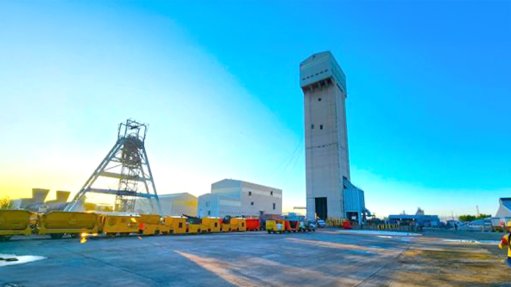Allied Steelrode, seven others join task force to lobby for support of downstream steel industry
Steel supplier and processing company Allied Steelrode has affirmed its commitment to an industry representative group the CEO Task Force, which will aid in regenerating the country’s steel sector, through mobilising the downstream industry – which suffers the most when challenges arise in the steel industry.
The CEO Task Force was born out of a Southern African Institute of Steel Construction (Saisc) mobilisation meeting that was held earlier this month and consists of eight members; comprising members of the steel processing and construction sectors and members of Saisc and government. These are Allied Steelrode, MacSteel, Betterect, Tass Engineering, Genrec Engineering, Trident Steel and the Strategic Economic Advisor to the Office of the MEC: Gauteng Department of Economic Development.
Part of the Task Force’s action plan, which will be discussed at its inaugural meeting on May 24, will be to create awareness of the industry downturn at events such as investment and/or job summits, to gather facts and figures (micro-information) from the downstream steel industry to illustrate the effects of the downturn in cohesive reports, which will be presented to government, and to provide a platform where downstream industry players can raise their concerns.
Additionally, the Task Force will try to establish new steel markets both locally and in neighboring countries, since the market in South Africa is oversaturated with downstream steel suppliers versus a lack of new infrastructure investment projects.
The biggest challenge affecting the downstream steel industry is the inability to negotiate the buying steel price, which has gone up from R9 000 a ton to R11 000 a ton in the last 12 months; and from R8 000 a ton to R11 000 in the last 24 months.
“Because of its volatile and unrealistic pricing model – as well as the protective tariffs that safeguard the primary steel producer – these factors have allowed [the primary producer] to put the price up a substantial amount, creating further price volatility, which I believe is not necessarily market-related,” explains Allied Steelrode executive director Warne Rippon.
Until March 2006, the primary steel producer used import parity pricing – where the price of steel was set based on what it would have cost if the product had been imported – as is common in most global steel markets today.
In March 2006, however, an international ‘basket of prices’ was introduced, reportedly to enhance transparency in the pricing system and allow for the introduction of a major rebate system. This ‘pricing basket’ was calculated by taking an average of domestic mill prices (excluding freight), for steel in China, Germany, Russia and the US.
However, the bottom line is that for Allied Steelrode and its downstream customers the effect of price fluctuations is potentially severe. “Unfortunately, if there is not some rationalisation of pricing levels, we – along with many other companies in the industry – will be forced to import more of our steel requirements,” says Rippon.
He adds that the primary steel producer will often change pricing once the lead time for steel requirement imports passes and the goods are being loaded for delivery, which creates uncertainty around pricing for the downstream suppliers as well as their customers.
There is also a 12% safeguard tariff, which next year will decrease to 10% and 8% the year after, to protect the primary producer when steel products are imported, since the primary producer employs perhaps 9 000 people that need safeguarding.
However, Rippon notes that the downstream steel industry employs about 190 000 people, of which some 57 000 jobs (about 30% of the collective workforce) have already been lost in the last six months, owing to the high steel purchase price and protective tariffs, which are collectively putting pressure on companies regarding their margins and production capacity.
“We want a fair trade industry, with all players having the same opportunities. Procuring locally-produced steel has also lost its momentum owing to overpricing.”
Effects on the downstream steel industry have been a prevailing ‘low growth’ economy, few projects available, fewer sales and red tape in terms of doing business.
“Steel is the backbone of the manufacturing sector, necessary for a healthy export market as well as a healthy economy overall. The relationship between the primary producer, government and downstream market members needs to be restored, while also having a stable and reality-based pricing system going forward.
The CEO Task Force will do its best effort in this regard to restore stability, and will meet to review progress made and put the next steps in its action plan into place on a regular basis, in order to achieve the dynamic, multi-level advocacy approach required to achieve meaningful and positive industry change,” Rippon concludes.
Article Enquiry
Email Article
Save Article
Feedback
To advertise email advertising@creamermedia.co.za or click here
Comments
Announcements
What's On
Subscribe to improve your user experience...
Option 1 (equivalent of R125 a month):
Receive a weekly copy of Creamer Media's Engineering News & Mining Weekly magazine
(print copy for those in South Africa and e-magazine for those outside of South Africa)
Receive daily email newsletters
Access to full search results
Access archive of magazine back copies
Access to Projects in Progress
Access to ONE Research Report of your choice in PDF format
Option 2 (equivalent of R375 a month):
All benefits from Option 1
PLUS
Access to Creamer Media's Research Channel Africa for ALL Research Reports, in PDF format, on various industrial and mining sectors
including Electricity; Water; Energy Transition; Hydrogen; Roads, Rail and Ports; Coal; Gold; Platinum; Battery Metals; etc.
Already a subscriber?
Forgotten your password?
Receive weekly copy of Creamer Media's Engineering News & Mining Weekly magazine (print copy for those in South Africa and e-magazine for those outside of South Africa)
➕
Recieve daily email newsletters
➕
Access to full search results
➕
Access archive of magazine back copies
➕
Access to Projects in Progress
➕
Access to ONE Research Report of your choice in PDF format
RESEARCH CHANNEL AFRICA
R4500 (equivalent of R375 a month)
SUBSCRIBEAll benefits from Option 1
➕
Access to Creamer Media's Research Channel Africa for ALL Research Reports on various industrial and mining sectors, in PDF format, including on:
Electricity
➕
Water
➕
Energy Transition
➕
Hydrogen
➕
Roads, Rail and Ports
➕
Coal
➕
Gold
➕
Platinum
➕
Battery Metals
➕
etc.
Receive all benefits from Option 1 or Option 2 delivered to numerous people at your company
➕
Multiple User names and Passwords for simultaneous log-ins
➕
Intranet integration access to all in your organisation




















